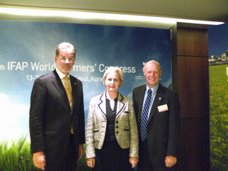In Tunisia and in Morocco, ‘sowing without ploughing’ (no till) was introduced through grassroots groups and associations. As a result the farmers’ income ánd environmental sustainability increased. This approach through associations enabled quick replication and stable linkages to research institutes. The case illustrates how gradual and long term support to these important change processes has been necessary for farmers to fully adapt. Moreover, exchange with farmers in France, has been an extra motivation for the farmer groups to bundle their forces. Finally, the fact that organised farmers have been able to buy collectively capital intensive equipment has certainly contributed to the success.
“Direct sowing has major positive effects in reducing erosion and shows also important labour saving and cost saving characteristics that allow vulnerable farmers to increase acreage and crop diversity. The project argues that facilitating the process of farmers to organise themselves in grassroots groups and into agriculture conservation associations that function as platforms of cooperation between research institutions, farmer organisations, technicians and private companies, has in particular promoted the introduction of this new technology. The introduction of the improved techniques is gradual. Farmers need to be convinced of the advantages and need to collaborate with each other before they invest in the relatively costly sowing equipment. A case study of a group of farmers of Mateur (Tunisia) illustrates these dynamics. The support started in 2001 by introducing the advantages of direct sowing to three farmers and by renting a no-till sowing machine. 17 ha were directly sowed. In 2002, their yields rose from 12QTx to 20 QTx and in 2003 from 54 QTX to 58 QTX. Four years later, in 2005-2006 after exchange visits with farmer groups in France, and Spain, seven farmers started a cooperative (El Manuel) and bought a seeder together. They sowed directly (without ploughing) 672 ha of land, which is 44% of their land. The yields of the crops have more than doubled. Whereas in 2001, direct sowing was only applied for wheat, now seven crops are directly sowed. The support has facilitated the process because it has covered a long term period allowing farmers to adopt the new system on approximately 80% of their land.” Similar dynamics have been observed in Morocco with support to the formation and activities of the Khemisset Chaouïa cooperative (started in 2000). The process of introduction of ‘no till’ cultivation was slightly different from in Tunisia but also shows some similarities. “Since 2000, 10 of the 20 farmers of the cooperative started ‘no till’ cultivation on 19% of their total acreage and for three crops. After years of borrowing cultivators, sometimes of inferior quality, the cooperative felt sufficiently confident to buy a no-till sowing machine in 2005. Now, approximately 30% of the members’ land is cultivated directly by the community-owned seeder. In all cases, yields are at least the same as in conventional systems.”
Thursday, March 13, 2008
Subscribe to:
Comments (Atom)
Check these interesting contributions from other sites & blogs
- On Farmers Organization in Egypt
- Law on farmers Organizations in China
- Interview with FAO officials on Farmers Organizations
- Farmers use mobile phones
- comment of Kees Blokland on anti-CAP campaigning
- Poverty & growth blog of the World Bank
- Gapminder statistics visualized
- Guide for implementing ICT projects - iCommons december 2006
- Africa: tools of liberalisation - Patricia Daniel, University of Wolverhampton, England
- Business and the rural poor - Harvard Business School
- Profiling Asian Farmers Association members - Jan 4th, 2007
- Fiji Times report on AgriCord grants to Sugar Farmers - January 04, 2007
- Increasing Impact - marrying micro-credit and micro-insurance - The disconfort Zone, january 4th, 2007
- Programs that Fight Poverty - Institute for Advanced Technologies in Global Resilience - November 17, 2006
- University of Chicago Press Journals reports on GMOs - January 25, 2007
- Biotech crops to help reduce poverty - Kauser A Malik, in the Daily Times (Pakistan) January 25, 2007
- Why does China grow so fast - Michael Spence The Wall Street Journal 23 january 2007





